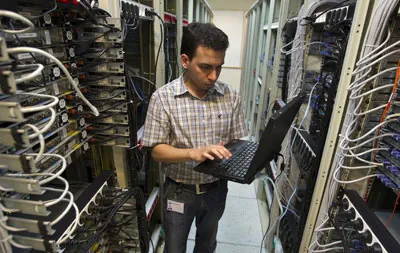Danny O’Brien/CPJ Internet Advocacy Coordinator
San Francisco-based CPJ Internet Advocacy Coordinator Danny O’Brien has worked globally as a journalist and activist covering technology and digital rights. Follow him on Twitter @danny_at_cpj.

What to do if Google warns of state-sponsored attack
Some journalists continue to receive the warning from Google about state-sponsored attacks that we mentioned last week. The message appears on top of logged-in services like Gmail. Occasionally it will disappear for a few hours and then reappear, but there is no way to remove it.
State-sponsored attacks: open season on online journalists
The last few weeks have offered the strongest indications yet that nation-states are using customized software to exploit security flaws on personal computers and consumer Internet services to spy on their users. The countries suspected include the United States, Israel, and China. Journalists should pay attention–not only because this is a growing story, but because…
Computer crime laws belie Thai claim to modern society
At online discussion sites all over the world, comments are posted on the Web as soon as they are written. People argue, inform, express anger, and voice fears. Some say things in the heat of the moment that they might go on to regret. Others are elliptical and obscure. The enabling of such conversations is…

Most censored nations each distort the Net in own way
One big reason for the Internet’s success is its role as a universal standard, interoperable across the world. The data packets that leave your computer in Botswana are the same as those which arrive in Barbados. The same is increasingly true of modern mobile networks. Standards are converging: You can use your phone, access an…
Verdict postponed in landmark Thai Internet freedom case
Earlier today, press and human rights groups from around the world heard that the decision in the case of Chiranuch “Jiew” Premchaiporn, the manager of Thai online news site Prachatai, was being delayed yet another month. Chiranuch is charged under Thailand’s Computer Crime Act for 10 counts of not deleting apparently anti-monarchy comments on Prachatai’s…
UK surveillance plan must be watched carefully
When journalists make enemies in high places, they become vulnerable to the powers those figures wield. One such power is the state’s capacity to wiretap and obtain personal records from communications companies. From Colombia’s phone-tapping scandal to last year’s case of Gerard Davet–a Le Monde reporter whose phone records were obtained by the French intelligence…
Iraqi cybercrime bill is the worst kind
After the rash of political revolutions and criminal attacks on governments and companies last year, it wasn’t hard to predict that 2012 would be the year of a cybercrime crackdown. The United States is considering its own cybercrime legislation, and the European Union is seeking to harmonize its member state’s computer crime laws. Governments understandably…
Online news sites as battleground for Mexican drug war
I’m in Culiacán, the capital of the Mexican state of Sinaloa. Part of my work here has been to investigate and highlight the cyber-attacks that the award-winning weekly local newsmagazine Ríodoce has encountered in its coverage of the violent drugs war here. But discussing the experiences of online editors at other publications here has shown…